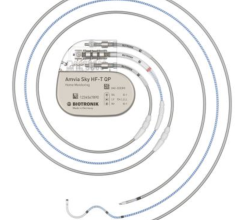
CardioMEMS sensor
February 25, 2022 – Abbott has announced that the U.S. Food and Drug Administration (FDA) has approved an expanded indication for the company’s CardioMEMS HF System to support the care of more people living with heart failure. With the expanded indication, an additional 1.2 million U.S. patients1 are now eligible to benefit from advanced monitoring with the CardioMEMS sensor, which marks a significant increase over the current addressable population. The sensor provides an early warning system enabling doctors to protect against worsening heart failure.
More than 6.2 million Americans have heart failure2, with diagnoses projected to double3 by 2030. While heart failure is a chronic disease, medical options like CardioMEMS can provide patients and their doctors with actionable insights to help manage heart failure before it progresses to a later stage. The CardioMEMS sensor is a paperclip-sized device that, once placed in the pulmonary artery during a minimally invasive procedure, monitors for pressure changes that indicate worsening heart failure. The sensor wirelessly transmits daily pressure readings to a patient’s clinical team – allowing physicians to make therapy changes to combat progression to later-stage heart failure while empowering the patient to manage their condition from virtually anywhere.
The CardioMEMS HF System was initially approved in 2014 for use in New York Heart Association (NYHA) Class III heart failure patients with a prior heart failure hospitalization within the last year. The new indication allows the CardioMEMS sensor to be used by people living with Class II heart failure and for patients who undergo a blood test showing elevated levels of biomarkers known as natriuretic peptides, which indicate worsening heart failure.
"Heart failure is a race against time where too often we’re behind because patients are not getting care early enough," said Philip B. Adamson, M.D., chief medical officer of Abbott's heart failure business. "This expanded indication means physicians can treat more people with earlier-stage heart failure, providing the opportunity to prevent further suffering and possibly avoid later-stage progression that can have a profound impact on a person’s quality of life."
Clinical Data Reveals Benefits of Remote Monitoring
The CardioMEMS HF System’s expanded indication was supported by clinical data from the GUIDE-HF trial. Based on study data adjusted for the impact of COVID-19, both Class II heart failure patients and patients with elevated natriuretic peptides were suggested to have better outcomes when their therapy was guided by pulmonary pressure monitoring, with a respective 34% and 25% reduction in heart failure hospitalizations, emergency visits and death.
Class II heart failure is generally categorized as mild heart failure where patients have a slight limitation with physical activity. Patients in Class II heart failure may feel comfortable at rest but routine physical activity, such as getting the mail, can cause fatigue or shortness of breath. Since the disease can advance to Class III and IV heart failure if left untreated, it’s critical for earlier-stage patients to explore the most effective medical options to manage the disease at its onset.
"As the number one cause for hospitalizations in people age 65 and over, heart failure is its own pandemic in the United States," said J. Thomas Heywood, M.D., director of Advanced Heart Failure and co-director of the Pulmonary Hypertension Program at Scripps Clinic in La Jolla, Calif. "Utilizing the CardioMEMS HF System to monitor for signs of worsening heart failure has been shown repeatedly to reduce hospitalizations for patients with later-stage heart disease. The new data provided by the GUIDE-HF study means we can extend these benefits to less sick patients. In the United States alone, this could have a positive impact for more than a million people suffering from heart failure."
Actionable Insights Lead to an Active Life
Robert (Bob) Birdwell, D.D.S., a retired dentist, enjoyed an active lifestyle before being diagnosed with heart failure. He had difficulty controlling his high blood pressure and felt drained walking to the mailbox. In 2020, Bob received CardioMEMS as a GUIDE-HF trial participant.
"In dentistry, we live in the preventative world of maintaining good oral health. The same concept applies to heart disease where my CardioMEMS is a preventative measure," said Bob. "I have not had a heart failure-related hospitalization since receiving it. I feel grateful."
Nearly two years later, Bob and his wife Vinnie are back to playing golf and exploring their Colorado community. For more on his story, click here.
About the GUIDE-HF Clinical Trial
The GUIDE-HF study included a randomized arm of 1,000 patients and a single arm of up to an additional 2,600 patients that is currently enrolling for a total of 3,600 patients across 118 centers in North America. All patients were implanted with a CardioMEMS sensor, but therapy for patients in the control arm was not guided by the device. In an analysis of data adjusted for the impact of COVID-19 (captured prior to March 13, 2020 – the date the U.S. national emergency was declared), CardioMEMS demonstrated a significant 19% reduction in the study's composite endpoint and a 28% reduction in heart failure hospitalizations. The results of GUIDE-HF were presented at the ESC Congress 2021 (organized by the European Society of Cardiology) in August 2021 and simultaneously published in The Lancet.
Indications and Important Safety Information:
For U.S. important safety information for the CardioMEMS HF System, visit: https://www.cardiovascular.abbott/us/en/patients/treatments-therapies/pulmonary-artery-pressure-monitoring-for-heart-failure/important-safety-information.html.
Reference:
1 Abbott Heart Failure Navigant Data 2021
2 Centers for Disease Control and Prevention. Facts About Heart Failure in the United States. Heart Failure | cdc.gov. Accessed Dec. 30, 2021.
3 American Heart Association. Heart Failure Projected to Increase Dramatically, According to New Statistics. Heart failure projected to increase dramatically, according to new statistics | American Heart Association. Accessed Dec. 30, 2021.


 July 02, 2025
July 02, 2025 









